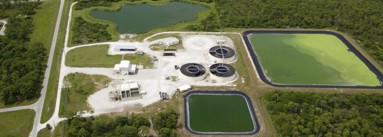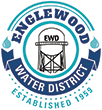WATER RECLAMATION FACILITY
The Paul J. Phillips Water Reclamation Facility (WRF) was dedicated November 17, 2005, and named for a former, long-time Board of Supervisors member. Mr. Phillips was instrumental in the conception and implementation of the Septic Tank Abandonment Program, and the construction of the WRF (Water Reclamation Facility.) The Water Reclamation Facility is committed to 100% recycling of biosolids and reclaimed water.
The WRF is a 3.4 MGD plant. The administration/motor control center building was constructed to withstand a Class 5 Hurricane.
Wastewater is collected and pumped to the 160 acre treatment facility property in Charlotte County. The U. S. Filter/Davco treatment plant is an extended aeration plant. The plant is designed to produce effluent that meets or exceeds all State and Federal reclaimed water requirements.
The EPA Primary Drinking Water Standards are required for the WRF’s ASR (aquifer storage/recovery) Well.
EXTENDED AERATION – the raw wastewater mixes with bacteria in the extended aeration process. The biomass growth in the aeration process treats the water. Flows from the aeration tank enters a clarifier that allows biomass solids to settle and clear effluent to pass over the clarifier weirs. Solids are returned to the aeration tank to treat incoming raw influent. The treated effluent, or clear portion, then goes through 3 Aqua Disk Membrane Filter. The filtered effluent is chlorinated in a chlorine contact chamber. After disinfection has occurred, the water is pumped to reclaimed water customers or the aquifer storage recovery well (ASR) for future sale as reclaimed water.
During high rain events, the reclaimed water may go to the Deep Injection Well.
BIOSOLIDS – the Bio Solids are pumped from the wastewater treatment plant to the centrifuge and dewatered. With the application of polymer, the centrifuge is capable of removing 98% of the liquid from the biosolids. The biosolids are trucked to the Charlotte County Bio-Recycling Center Complex in Punta Gorda, FL for further advanced treatment. The liquid portion or centrate is pumped back to the plant for re-processing.
EWD produces an average 18% total solids sludge cake. The composting process naturally produces a DEP Class AA product. The DEP Class AA product is used on golf courses, farms, in parks and playgrounds, on street medians, and in mine reclamation horticulture.

